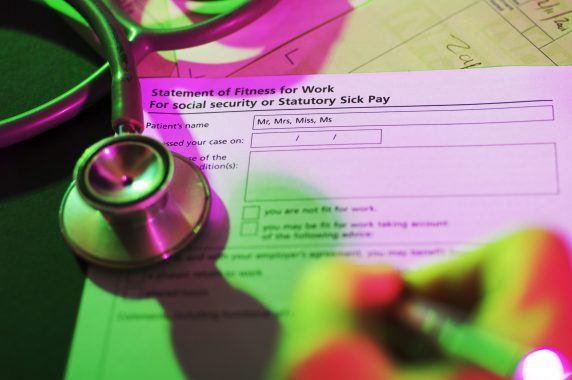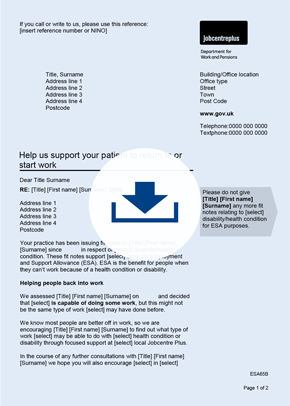How the benefits clampdown is undermining the GP’s role

‘I’ve got patients with Parkinson’s disease who can’t speak and rely on carers for feeding being told they’re fit for work.’
Birmingham GP Dr MayJay Ali is not alone. More than half of the 645 GPs responding to a Pulse survey last year said their patients had been refused welfare benefits despite their GP’s opinion that they were unable to work. In other words, GPs’ expert opinions about their patients’ health are being ignored.
Official statistics back them up. Pulse’s analysis of figures from the Department for Work and Pensions reveals 68% of employment support allowance (ESA) claimants assessed as ‘fit for work’ at their initial assessment later successfully had the decision overturned. To put this into context, in 2010, only 36% of decisions were overturned.
GPs warn a small but key change this year is the latest in a series of moves by the DWP that serve to undermine GPs’ role as advocates for their patients – and as experts on their health.
Under the system, people off work long term undergo a DWP-run ‘workplace capability assessment’ to determine their eligibility for ESA. If this deems a person ‘fit for work’, the GP is informed by letter.
This year, this letter was changed to inform GPs that, as the DWP has declared the patient fit for work, the GP ‘does not need to provide any more fit notes’.
Detrimental impact on patients
GPs strongly criticised the change, pointing out that they are the medical experts and their view on a patient’s fitness for work has more validity than that of a non-medically trained assessor. They said the move undermined their role.
It also affects the GP-patient relationship. As then RCGP chair Professor Helen Stokes-Lampard put it at the time: ‘GPs are not benefits assessors and must never be used as barriers for patients to receive benefits when they are entitled to them, as ultimately, this can have a detrimental impact on their health.’
Following the criticism, the DWP made amendments. But even the revised letter says: ‘We no longer need [fit notes] for your patient as they are fit for work.’ The concession, in small print, says GPs can offer fit notes if the patient ‘asks you for evidence for a reconsideration or appeal’.
Dr Ali says ministers are taking an increasingly heavy-handed approach to financial support for sick people: ‘I’ve noticed the [Government’s] assessments don’t seem as fair as they used to be. A lot of my patients whom I would expect to be eligible for benefits are told they’re fit for work.’
And the latest DWP figures show one in three of the 250,000 initial ESA work assessments between April 2018 and March 2019 resulted in claimants being deemed fit to work and refused benefits.
Croydon GP Dr Adnan Siddiqui says: ‘The Government is using assessments as though there is some sort of objective way to assess these things. I usually tell patients the whole set-up is geared to be superficial, to make them fail. But I say, if you persevere, you will most likely win.’
While some patients’ claims may not be genuine, the large proportion of successful appeals indicates a problem with initial DWP assessments. Of almost 2,000 appeals by patients with mental health and behavioural disorders, 72% saw the DWP decision overturned, while 68% of some 1,700 patients with musculoskeletal conditions also appealed successfully.
But often damage has already been done. GPs say appeals can take anywhere from a few weeks to 12 months, bringing anxiety and financial distress for patients. Those suffering from mental health conditions often experience a worsening of symptoms.
Dr Siddiqui says the DWP wrote to him about three patients, telling him they were suicidal after the assessment. This came as no surprise, he said, given that one patient compared the assessment centre to a ‘police interrogation cell’.
I usually tell patients the whole set-up is geared to be superficial, to make them fail
Dr Adnan Siddiqui
All this means extra work for GPs. Dr Ali says: ‘I have to write to the DWP to ask why my patients’ benefits are being stopped and explain why I think they need them. That’s not really my role.’
The DWP assessments also mean GPs come under pressure from patients. Matthew Johnson, a lecturer in politics at Lancaster University spoke to 11 GPs in 2017 about this issue as part of research on deprivation in North East England.
He says: ‘There is evidence to suggest GPs with concern for the wellbeing of their patients often feel a duty to support them as they navigate the benefits system.
‘This can lead to practices in which GPs prescribe medication recognised by assessors as an indicator of serious pain or ill health. This is apparent in the use of opioid painkillers, which ought to be of serious concern and would be avoided were the benefits system different’.
The DWP argues its assessments are carried out by health professionals given specific training in assessing people with a range of mental and physical health conditions. It says it works closely with its contractor to ensure assessments are of the ‘highest possible standard’.
A decision is overturned usually because the claimant has provided more information
Spokesperson for the Department for Work and Pensions
A spokesperson says: ‘Our decision makers consider all the available evidence, including information provided by a claimant’s GP or specialist.
‘In most cases where a decision is overturned at appeal it is usually because the claimant has provided more information.’
But GPs say the problem will persist until assessors truly start to listen to patients.
Dr Ali says: ‘We need to bring back the benefits system which aimed to help patients while they’re sick and we need to use that as the foundation for the assessment. But if the starting point for the assessment is to get a certain number of people off benefits, then they will never improve.’
When GPs are ignored
‘Patients are being summoned to assessment centres despite my advice’
‘We have patients on a supported-living farm with moderate to severe learning disabilities. They need a social worker to help them wash and dress. They do work in the farm shop, but it’s all for therapeutic purposes.
‘But a lot of them are being summoned to assessment centres, despite me writing extensive reports on the severity of their disabilities.
‘Somebody with spinal stenosis might be asked how far they can walk and reply: “On a good day I can walk 200-300 yards. On a bad day, I am confined to my house.” The assessors choose the good day and don’t take into account the variability.’
Dr Dominic Hennessy, a GP in Dorset
‘One patient with Parkinson’s has difficulty speaking… but the report said his speech was normal’
‘I have patients whose clinical signs are clear but the assessment doesn’t reflect that. For example, one patient with Parkinson’s disease has unfortunately progressed significantly and I find it very difficult to understand his speech. So a 10-minute consultation will normally take half an hour. But I know him so I can make out most of his language.
‘He told me that in his assessment the assessor couldn’t understand him and he had to go and get his wife from the car to translate. Yet in his report it said that his speech was normal and he was fit to work. And there is no way on earth this man has normal speech.’
Dr MayJay Ali, a GP in Birmingham
Pulse October survey
Take our July 2025 survey to potentially win £1.000 worth of tokens











